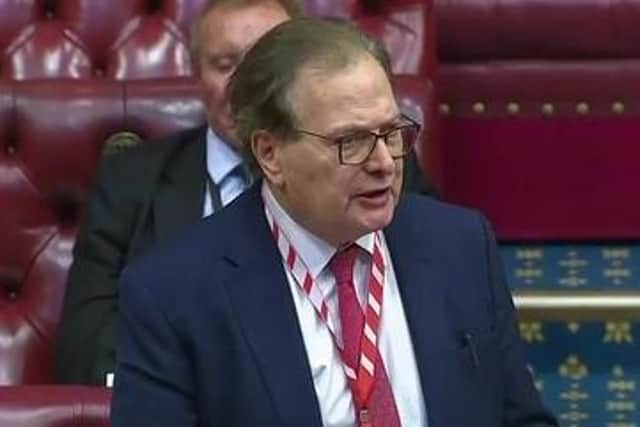Peers hand government first defeat in House of Lords on controversial Rwanda deportation bill


Inflicting a defeat against the government, the House of Lords backed by 214 votes to 171, majority 43, an unprecedented move seeking to delay a treaty with the east African nation that paves the way for the divisive asylum scheme.
The unelected chamber supported a call by the Lords International Agreements Committee (IAC) that Parliament should not ratify the pact until ministers can show Rwanda is safe.
Advertisement
Hide AdAdvertisement
Hide AdThe government agreed the legally-binding treaty with Kigali in December, saying it addressed concerns raised by the Supreme Court about the possibility of asylum seekers deported to Rwanda then being transferred to a country where they could be at risk.
But the cross-party committee said promised safeguards in the agreement are “incomplete” and must be implemented before it can be endorsed.
Unlike the Commons which has the power to delay ratification of a treaty, the Lords can only advise.
However, ignoring the demand by peers could later be used in a legal challenge against the government.
Advertisement
Hide AdAdvertisement
Hide AdThe treaty underpins the government’s Safety of Rwanda (Asylum and Immigration) Bill which compels judges to regard the country as a secure haven.
The initial blow delivered by peers, uneasy over the stalled deportation plan to put some asylum seekers on a one-way flight to Africa, signals a rough ride for the legislation, despite the prime minister urging the Upper House not to block the “will of the people”.
Labour former attorney general Lord Goldsmith, who chairs the IAC, said: “In total our report identifies at least 10 sets of issues where on the basis of the government’s evidence significant additional legal and practical steps are needed in order to implement the protections the treaty is designed to provide. The difficulty is that the government has already presented a bill to Parliament asking it to make a judgment that Rwanda is safe now.”
Lord Goldsmith added: “We are not saying the treaty should never be ratified but we are saying that Parliament should have the opportunity to scrutinise the treaty and its implementing measures in full before it makes a judgment about whether Rwanda is safe.”
Advertisement
Hide AdAdvertisement
Hide AdBut Conservative former Cabinet minister Lord Howell of Guildford said: “What does safe mean? It is an entirely subjective concept and always will be.
“In our own judicial system, is that safe? I don’t know. I am not sure all our postmasters would agree about the safety of our own judicial system.”
This was a reference to the hundreds of branch managers in the UK wrongly convicted because of a faulty accounting IT system in one of the biggest miscarriages of justice in British legal history.
Referring to comments by Mr Sunak, Labour former shadow attorney general Baroness Chakrabarti said: “I would suggest that instead of there being this sort of telepathic connection between any individual leader and the will of the people, in a constitutional democracy … it is Parliament that will reflect, to the best of its ability, the will of the people, and certainly represent people in this country, but also champion the rule of law.”
Advertisement
Hide AdAdvertisement
Hide AdLiberal Democrat Lord Razzall said: “If we go back to the beginning, the whole reason for the proposal to send people to Rwanda was that it was going to be such a hellhole that nobody would want to get on a boat if they thought they were going to go to Rwanda.
“The dilemma the government now faces is that, because of the Supreme Court, they have to demonstrate what a wonderful, safe place Rwanda is. I wonder whether this might just be a moment for them to reflect on the purpose of their policy.”
Responding, Home Office minister Lord Sharpe of Epsom said: “The Rwanda partnership was created to enhance the UK’s efforts to tackle illegal migration which is costly to the British taxpayer and imperils the lives of those making highly dangerous journeys.”
He faced jeers as he said: “This begs the question is Labour using the House of Lords to try to frustrate our plan to stop the boats?”
Advertisement
Hide AdAdvertisement
Hide AdLast week the prime minister urged the opposition in the House of Lords to get on board and do the right thing to stop the boats.
“You have a choice tonight – push this amendment to try to obstruct an effective deterrent or back down and let this treaty pass.”
The second reading debate on the Rwanda Bill is due to be held in the Lords on January 29.